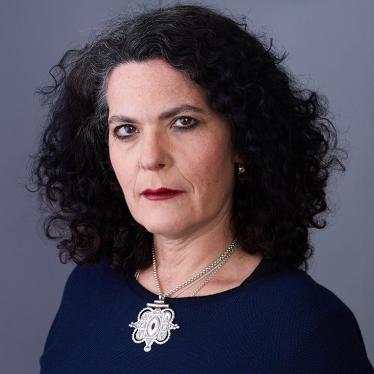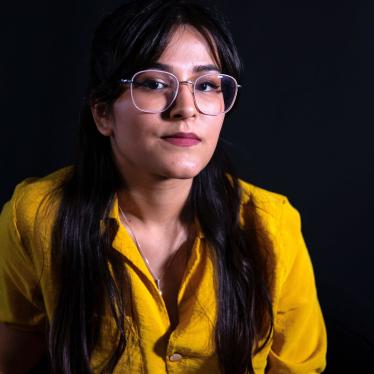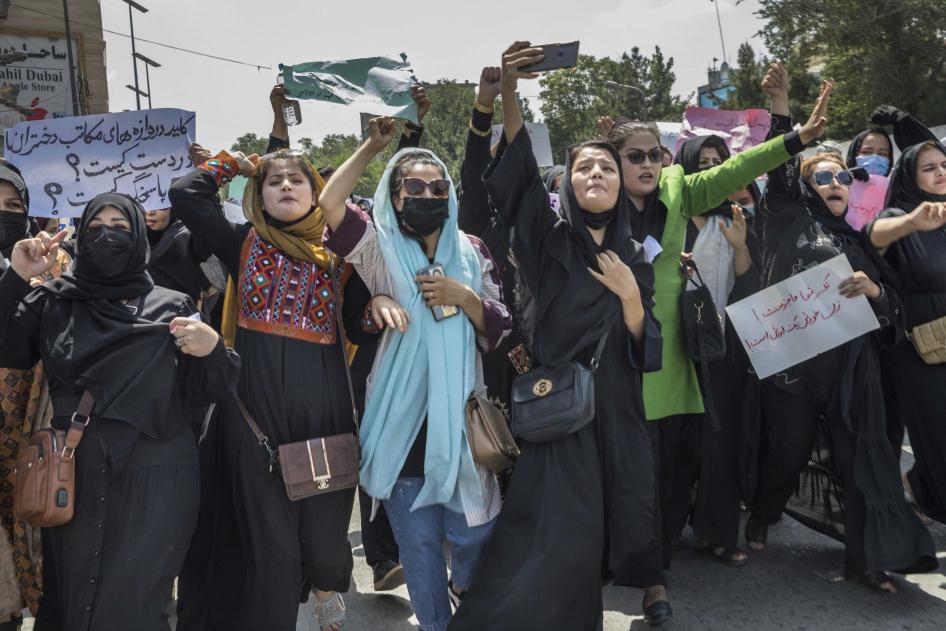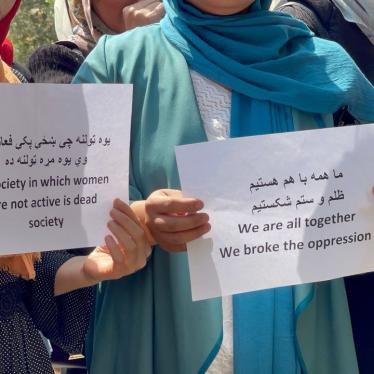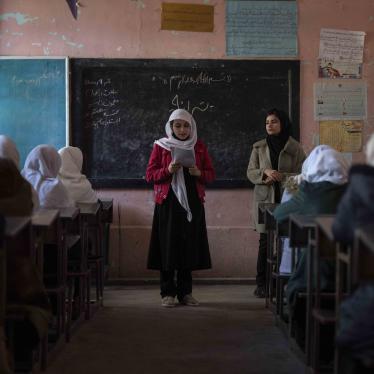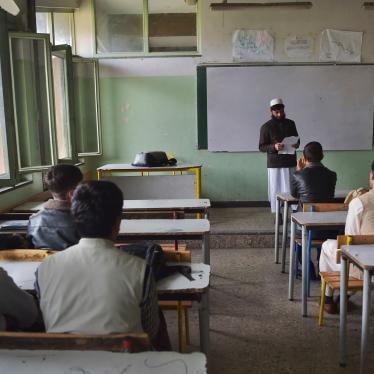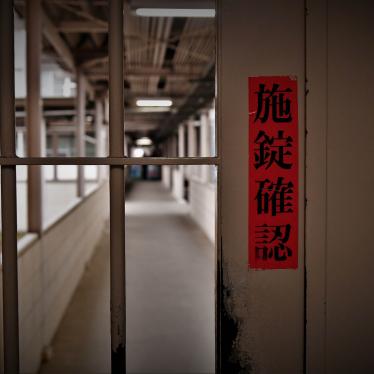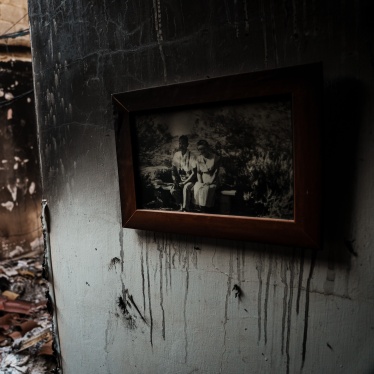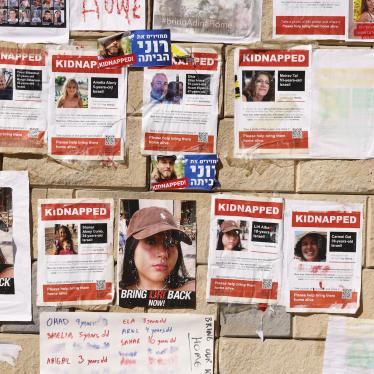Girls are banned from secondary education in the vast majority of Afghanistan’s provinces. Women are banned from most employment. Women in universities face harsh new restrictions. Many female teachers have been dismissed. The policy of requiring a mahram, a male family member chaperone, to accompany any woman leaving her home, has not been officially stated, but Taliban officials on the street are often enforcing it, as well as harassing women about their clothing. Rules requiring women to have a mahram with them have been imposed for women travelling long distances or leaving the country. The Taliban have ordered women to cover their faces in public, including women journalists reporting on television.
Since taking over Afghanistan in August 2021, the Taliban have systematically dismantled the system designed to protect women and girls from gender-based violence, including closing almost all shelters for women and girls. Women’s sports are banned and there are new barriers to women obtaining health care. The Taliban appointed an all-male cabinet. They abolished the Ministry of Women’s Affairs and handed over the building to the reinstated Ministry for the Propagation of Virtue and the Prevention of Vice, responsible for some of the worst abuses against women during the Taliban’s previous time in power, from 1996 to 2001.
This is life for women and girls under the Taliban 2.0, in 2022. We need to take stock of how this happened and what 20 years of Western promises to always stand by Afghan women mean now. We thought we would talk about it.
Heather: In November 2001, then US Senator Hillary Clinton wrote: “By empowering women with the freedom to choose their own future, we can help Afghanistan become a symbol for people elsewhere who have yet to share in the opportunities provided when human rights include women’s rights.” I’d love to hear your reflections on that statement, today, in 2022.
Sahar: There is much to unpack here. First, it sounds like a decent campaign slogan, which is not particular to the US, and it’s very clear now that it is a failed one. Second, if I believed that the US and its allies were the saviors of Afghan women, it would have evoked some feeling of betrayal in me.
But reflecting on the sentence, it is clear to me that it comes from an imperialist and colonial world view that not only pictures Afghan women as passive beings but paints the US and the West more broadly as the ultimate moral authority setting up a good example in Afghanistan for other nations to follow. It gives you a sense that Afghanistan is one among many US colonial adventures. I am continually amazed that the US claims the moral authority to question other countries, but almost no one gets to hold the US accountable for its failed promises.
As a Western woman, how did you first hear about women’s rights in Afghanistan?
Heather: I was a young lawyer working with prisoners in New York City. Like a lot of Americans, I didn’t pay much attention to international news. I would have struggled to find Afghanistan on a map. Then 9/11 happened. I watched the Twin Towers fall from the roof of my apartment building in Manhattan’s East Village. Suddenly we were all glued to the news, all day and all night. Three days later I went to a peace vigil in Union Square. We could all feel that war was coming but we didn’t know where. Then we started seeing images of Afghan women in fluttering blue burqas on the news every day and everyone was talking about Taliban abuses against women. I understood very clearly that we were being told that we had to invade Afghanistan to rescue these women. It was confusing. I was against war, but I did feel like I cared about Afghan women.
It’s painful to look back on that moment and think about the decisions that were made in response to Al Qaeda’s attacks on the United States—President George W. Bush’s “global war on terror”—and what those decisions meant for people around the world, including Afghans. We need to remember how men—who didn’t seem too concerned about the situation of Afghan women on September 10, 2001–found feminist rhetoric helpful in building support for their war. We should also ask hard questions about how Western feminists helped in this effort, and with what level of cynicism.
What does 9/11 represent to you?
Sahar: I was too young to understand what 9/11 was. But the aftermath of 9/11 significantly marked my life, and it continues to do so. For Afghans, 9/11 is closely tied to the 2001 US-led invasion of Afghanistan and the fall of the Taliban regime.
I acknowledge that 9/11 is a painful moment in US history, and I understand the pain, loss, fear, and uncertainty. I also think of Muslims around the world, and the way they were treated afterward — 9/11 and its consequences have not been easy for many outside the US. It is painful for many around the world for different reasons.
The consequences of 9/11 taught us that an American life is worth protecting at any cost, even if nations from the other side of the world would have to pay the price. I hate to make a comparison, but I want to highlight that the number of lives lost in the past 20 years as a result of the US and Taliban’s war is beyond anyone’s ability to count. These are the lost lives and dreams that no one accounts for.
Why do you think foreigners are so obsessed with burqas?
Heather: It’s very shocking to many Westerners, that women would wear—or be compelled to wear–a garment that obstructs your vision, impairs your movement, and removes you from public view and face-to-face interactions with others. It’s a potent symbol. Talking about how women and girls are denied education, employment, etcetera, always involves some degree of nuance. Discussions about burqas lend themselves to just plain outrage—no nuance.
When I arrived in Kabul in 2007, I shared an office with my boss, an Afghan woman. I said to her one day that many Americans thought we had invaded so she could take the blue thing off her head. She said, “Why on earth would Americans care what I wear on my head?” and she talked about how other aspects of equal rights—access to education and health care and political voice—were what really mattered.
Women’s bodies and dress are so often the battleground in cultural battles. The French ban burqas; the Taliban impose them. Both are expressing deeply sexist views. The French say they want to rescue Muslim women from their oppressive male family members—and that women concealing their bodies disrupts secularism. The Taliban see women’s bodies as so sexualized that every inch must be hidden from view for men to control themselves. Neither approach respects women’s agency nor free expression.
The obsession with burqas both resulted from and fed a narrative of Afghan women as the tragic victims of evil Muslim men, from whom they must be rescued by heroic Westerners (men, obviously). That story–that our brave soldiers will invade and defeat the Taliban and then the freed women will throw off their oppressive head coverings and weep for joy and gratitude–works much better with a sweeping soundtrack and a fluttering American flag than one where US officials humbly ask Afghan women’s rights activists whether there are ways they could be helpful to women’s centuries-long struggle for their own rights.
What does the burqa symbolize to you?
Sahar: To me, burqa, especially the blue burqa, has always symbolized a cage, a prison, and a symbol of all kinds of oppression that women in Afghanistan have faced and continue to face. Growing up, I have seen the way women were forced to wear them. I have also seen women who were given two options: either go out with a burqa or don’t go out. Throughout years, I grew to develop such strong hatred for it.
To this day, I have not ever tried wearing one.
At the same time, I never understood people’s obsession with the burqa. This includes people who somehow glorified it by making art and fashion out of it, and those Westerners who only presented images of Afghan women wearing the blue burqa. I was irritated by foreign scholars, journalists, and officials in Afghanistan who used imagery of Afghan women with burqa only. I thought they were not deeply engaged with the realities and changes in Afghan society. I also believed that no one really heard Afghan women.
Today, I still see the burqa as a symbol of oppression for Afghan women. However, looking from the outside (from the West now), I understand why some people see a need to take a nuanced approach in discussing the burqa. The growing Islamophobia in the West often makes it difficult for Muslim women to practice their rights there. France is one example, but there are many others.
However, everything must be analyzed and understood in their own specific contexts. Islamophobia is a growing reality in the West, not in Afghanistan. Therefore, people who rightfully defend Muslim women’s rights in the West, must be extra cautious and self-reflective so that their arguments don’t ignore the oppression and undermine the struggles woman in Afghanistan and other Muslim countries face–which are often symbolized by mandatory hijab and burqa.
Going beyond the discussion of burqa, I totally agree with you that women’s bodies are treated as a battleground and a site for many powers to exert control. In the same view, Afghan women’s bodies have been politicized. Throughout recent history, it is evident that our bodies have been treated as an exhibition and expression of sociopolitical progress and regression, as evident in the constant use of photos of Afghan women in Western attire in the 1970s and 1980s to support a simplistic view that this was a high point from which Afghanistan has fallen. In the past 30 years, we can see that the body of an Afghan woman is treated as: a territory to establish a khalifate on; later, a justification and a site to invade for the US and its allies; and then, again, a site and a reason for the Taliban to kill, reclaim power, and reimpose their rule.
Heather: There was a lot of discussion about the urban/rural divide in Afghanistan, and some people argue that the progress on women’s rights over the last 20 years never reached beyond urban elites. What are your views on that?
Sahar: There is no doubt that urban areas in Afghanistan provided access to more facilities, modern technologies, and established infrastructures compared with the rural areas, and the differences between the two can be significant. However, the way the urban/rural divide in Afghanistan has been discussed in relation to women’s rights and values is quite harmful.
Making such rigid dichotomies without digging deeper can be damaging. In such a view, one reproduces the narrative that women’s rights are a value brought into Afghanistan, and therefore, it has reached urban areas first. This view is both simplistic and problematic. It completely underestimates urban and rural people’s wisdom, values, and their quest for equality, and packages it as something given to them. In my view, the real picture is more complex, nuanced, and full of surprises.
Regarding the elites, I would argue that while yes, in Kabul and other big cities there were people fitting into the category of “social elites,” that was and is a reality coexisting with all the other realities. In the context of Afghanistan, due to war, instability, and migration it’s hard to define class and privilege by the parameters used in most countries.
For instance, Kabul social elites would include individuals who did not necessarily come from a wealthy family. Rather, those individuals had mostly received their status from their public and social involvement and commitment. As I said earlier, social elites are a reality along other realities — they stay in a metaphorical bubble that produces more bubbles, and they can at times misrepresent the country because of the privileges they have. But I have seen that members of such bubbles have had their own struggles, including challenging established structures such as patriarchy, ethnic hierarchies, and other inequalities.
You came to Afghanistan in 2007 to work on human rights for the United Nations. What was that like?
Heather: It felt exciting. It felt like the world was watching and you had a front-row seat for history in the making as the US, the UN, and others helped rebuild a country, with a belief that they were doing so almost from scratch. There were a lot of smart, young, idealistic and ambitious foreigners running around in jobs more senior than they would have been able to occupy elsewhere, with big ideas for how to “fix” Afghanistan. There was a hint of danger in the air, but not too much danger, just enough to make everyone feel brave and important.
There were meetings and more meetings, lots of coordination, lots of drafting plans. I think I watched three different sweeping plans for how to overhaul the justice sector go by and helped draft some of them. There was a feeling that Afghans were hopelessly incompetent, so you’d need to get a foreign consultant in to draft whatever plan you needed or have the bright young foreigners do it. Very little of those plans was ever implemented.
We were drafting laws and planning elections, and when the election didn’t go as planned, US Secretary of State John Kerry flew in to sort out who was going to be the president. On women’s rights, the Americans planned the largest women’s rights project funded by the US government anywhere, ever–a program to help teach Afghan women how to lead. So, yes, in retrospect that sounds very colonial, very arrogant, very ignorant — intentionally ignorant. We see now how it turned out.
What was your experience of being “aided” by the international community?
Sahar: This is a difficult question – it takes me to dark memories.
I am all for nuance, but some of the images that “aid” brings to my mind are quite ugly. Sometimes, it was about engaging with individuals who did not have any interest in Afghanistan whatsoever. Other times, it was about dealing with people with a superiority complex who had no idea what an Afghan life outside a fully protected compound would look like. It would often look like a reminder that the foreigners lives mattered more than ours. This is not a subtle feeling I had–it was openly practiced that way. There were clear hierarchies. I will share a story to help you picture it.
On May 11, 2018, I was sitting on a bench in front of the American University of Afghanistan preparing for graduation day. Due to security concerns, the main road on which the university is located, Darul Aman Road, was blocked. We were forced to walk a long distance to enter the university.
This day was an important milestone for us as well as our university. We were the second cohort that graduated after the Taliban’s multi-stage suicide attack on the American University of Afghanistan on August 24, 2016. For many of us, that day was about a celebration of survival as we continued the legacy of the loved ones we had lost on August 24 with the slogan we had learned after the attack that said: “education prevails.” My graduation day was a reminder of how lucky I had been for making it through, despite the 2016 attack, despite the uncertainties and constant fears after the attack, and despite the real possibility of additional attacks on the university.
However, it didn’t take me long to leave those reflections behind. In a matter of seconds, I had to clean a handful of dust from my face as my black graduation gown was thrown into the air by the helicopter that had landed on the university campus. It carried the then-US ambassador to Afghanistan, John Bass, and his wife, Holly Holzer Bass, from the US embassy to the campus. For a moment, I couldn’t collect my thoughts; the scene was poignant and surreal.
What had happened before my eyes illustrated the inequality of Afghanistan’s war, instability, invasion, dependency, helplessness, and surprisingly, “hope,” amid all of this. Many high-profile officials were invited to our graduation, which led to the closing of Darul Aman Road to ensure a safe perimeter around the university compound to protect them – a perimeter we as students had to traverse on foot, with the dangers and fears that entailed, to get into this safe zone. In addition to the closing of the main road for VIPs, what seemed hyperreal about the helicopter scene was the dust entering my throat and the visual exhibition of power exemplified in the lives that mattered more than ours. Their lives needed protection and special transport, while the students – who were supposedly being celebrated that day – had to traverse the same area by foot.
More important, the story had not started right at that moment, nor would it end there. This is just one snapshot—it can’t convey how pervasive these attitudes were. We had experiences like this every day, in our own country. I recently heard someone say, “Save us from the saviors,” and I couldn’t relate more.
You had a closeup view of the international community’s engagement on women’s rights in Afghanistan. How did that look like from the inside?
Heather: On women’s rights, you could see cracks all along. The foreign ambassadors were almost all men. Their aid agencies had lots of photos on their websites of smiling Afghan schoolgirls, but the discussions in the Presidential Palace between ambassadors and the president were almost always about security and troop strength. The US was quietly removing gender indicators from their programming; an anonymous official referred to women’s rights as “pet rocks.”
Just to respond to your story, I worked for a UN agency in which we received frequent security alerts by text message letting us know when there had been an attack, if there was a lockdown for UN staff due to heightened security threats, etcetera. There was a whole system—”white city” meant full lockdown, “green city” meant you could move freely, and so on. There was even an expat band called White City. I worked in a team of mostly Afghans and soon after I started, I got a call one day from an Afghan colleague asking a work question. I was surprised. I said, “There’s a lockdown and no movement today–why are you working?” He explained that the security text messages were not sent to “local staff”; our Afghan colleagues had all traveled to the office and were there working, while we were locked down for our safety, every time. I tried to change this, but the security team refused, saying the system didn’t have the capacity to text everyone.
As you say, this was one of the daily examples. I remember a meeting where Afghan women’s rights experts were invited for their expertise, but told not to sit at the main table, and a colleague who received threats, but the security director was too busy arranging to ship a pet dog to help. I could go on.
UN Security Council Resolution 1325 on Women, Peace and Security, adopted in 2000, states that women must have full participation in peace processes. How did you see that commitment play out in Afghanistan–and do you think things might have turned out differently if Resolution 1325 was fully respected?
Sahar: Resolution 1325 by itself is fantastic, and I am pretty sure the outcome would have been different if it were broadly respected and practiced throughout the past 20 years in Afghanistan. The dynamic would be different, the demands would have been more inclusive; it was mostly those few women present in the negotiations who raised concerns related to the protection of women’s rights and ethnic and religious minorities during the negotiations. The representation would have been stronger.
But it’s hard to argue that Resolution 1325 would have produced a different and more positive outcome in the process that played out in the last years, because the 2018 peace process was forced on Afghanistan by the US. I would argue that the intentions to initiate the peace negotiations were not on behalf of the Afghan people. It was a forced process. It was hierarchical–the US gave much leverage to the Taliban throughout the process–it was not thoughtfully planned, it was rushed, and Afghan women were condescendingly given a maximum of four seats in the intra-Afghan dialogue portion of the negotiations and had no voice in the discussions between the US and the Taliban. Therefore, even if Resolution 1325 had been fully applied, it wouldn’t have been all about the will and demands of Afghan people–simply because the one who pays the piper calls the tune.
Heather: What lessons do you think Afghan women took from the last 20 years?
Sahar: The last 20 years taught various lessons to Afghan women, but the lessons learned might differ for my generation than for the generations before us. Afghan women are not a monolithic category, so I am sure there is not one collective response to this question. I am from a generation that went through our life journey from childhood to adulthood during the 20-year period of international presence. For the first 10 years, I was too young to comprehend the situation. However, in the past 10 years I have had the opportunity to observe the situation from the inside and outside.
One lesson that I think is important would be: not forgetting that we — Afghan women – were used to justify the “war on terror,” but it was never really about us and our freedom. If it was about Afghan women, the Taliban would not have been allowed to regain power to rule over and roll back every achievement that women in Afghanistan had gained. Seeking to justify the war in the name of “saving Afghan women” was harmful and introduced us to the world as sheer victims in need of help. It was colonial and condescending, and we still have to deal with its consequences. This should never happen again.
As states in the US dismantle the right to access abortion, we’ve seen US activists make references to the “Texas Taliban.” Why are people saying that and what do they mean?
Heather: There’s a feeling of disbelief among many Americans about what’s happening in the US with the Supreme Court overturning Roe v. Wade—not to mention other escalating rights violations such as abuses against migrants at the border and attacks on the rights of trans people. When you grow up in the US my experience at least is that you are told all the time that the US is the greatest country in the world, and it is a beacon of human rights, and everyone else wishes their country could be like the US. You pledge allegiance to the flag every day at grade school: “One nation under God, indivisible, with liberty and justice for all.”
If you are marginalized within the US—you’re a person of color, you’re the descendant of enslaved people, you’re Native American, for example—that pledge likely always sounded false. There have been a lot of harmful ways in which US feminist movements have prioritized the needs of white women; there is also a reproductive justice movement that has been trying for decades to change that. But the indoctrination is strong, as are racial hierarchies in the US. So, we see this rhetoric a lot, a kind of “this can’t be happening here” rhetoric, as if rights violations that might seem unsurprising elsewhere could never happen in the US, and now they are happening there, and isn’t it shocking.
Islamophobia is very real in the US, too, some of it probably rooted in how Taliban abuses were used to sell the US public on war in Afghanistan. So, talking about the Texas Taliban is a way of “othering” the Christian extreme right that’s influencing what’s happening in the US, by evoking imagery of a dark non-Christian force like the Taliban coming to destroy the rights of good American women—as opposed to naming the underlying homegrown white supremacy and patriarchy.
It’s a missed opportunity to build solidarity between Afghan and US women, who have in common the ways that perennial global misogyny is harming us all, and to see both Afghanistan and the US as places where intersectional rights abuses are unfolding in terrifying ways. We have a lot in common at the moment–the experience of having fought for decades to build on what we thought were solid women’s rights achievements only to see them swept away with dizzying speed.
What do you think happens next for Afghan feminists, especially younger Afghan feminists?
Sahar: I believe we have a long way to go and many lessons to reflect on and learn from. Considering the depth of the Taliban’s misogyny, there is a lot to do for those inside the country and those who live outside. Unfortunately, we need to start from scratch, fight for the very basic rights, as if the past 20 years did not exist and as if nothing had been done in the past, which is not true. Feminists and women’s rights activists inside the country have been very brave and quite clear with their demands after the Taliban’s takeover. They protested and paid the consequences, and they continue their protests even in such unbelievably difficult circumstances.
For the Afghan feminists outside Afghanistan, it essential to listen to and work with feminists and women inside the country, especially if we are talking about them, and ask questions when we are unsure. Making strong allies and developing a sense of allyship, thoughtful activism, continuous self-reflection, and respectful engagement, and making good use of the platforms we have and are given, will hopefully make the work of activists and feminists inside Afghanistan easier.
You spent several years as interim women’s rights co-director at Human Rights Watch, trying to keep an eye on women’s rights developments all over the world. How relevant is what’s happening now in Afghanistan to the global effort to promote gender equity?
Heather: I believe that what is happening in Afghanistan is hugely consequential for women’s rights globally. The Taliban’s violations of the rights of women and girls were deeply shocking when they were last in power, from 1996 to 2001. But they should be far more so now. In the years since 2001, there has been uneven but overall important progress toward respecting the rights of women and girls in most countries around the world. In 2014, Sweden became the first country to declare that it has a “feminist foreign policy”; many other countries are now following Sweden in making such a commitment. So we have a right to expect countries around the world to be much more active in opposing Taliban abuses against women and girls this time around, to coordinate closely with each other on this crisis, and to make it a major priority in their foreign policy.
But we’re just not seeing that kind of response. The response has been uncoordinated and lacking in urgency. There has been a huge outpouring of statements condemning the Taliban’s actions, for example after they extended the ban on girls’ secondary education on March 23, 2022, and at the July 2022 urgent debate at the UN Human Rights Council. But those strong and seemingly unanimous statements have not translated into a vigorous and coordinated response. The solutions aren’t easy, mostly because the Taliban do not seem very susceptible to pressure, but when there is such global consensus on something like girls’ right to attend secondary school, we should be seeing a much stronger response.
I think it raises really serious questions about how male-dominated political leadership still is globally and how often commitment to women’s rights at the highest levels doesn’t go much beyond lip service and aid funds. That has consequences for all women everywhere.
Sahar: Russia began its all-out war in Ukraine six months after the West left Afghanistan. It’s hard not to notice the difference between how Afghan and Ukrainian refugees are being treated. What do you think the reasons are?
Heather: Sometimes it just feels like people are ready to be passionate about the new war and are sick to death of hearing about the old one. The conflict in Ukraine of course has Cold War overtones for the West—it reminds everyone of the days when the Soviet Union and the US were locked in an existential struggle. And conflict in Europe brings back a lot of bad memories for Europeans. We also can’t ignore the psychological impact of how the West has experienced their military engagement in Afghanistan as not only stretching on forever but also ending in humiliating defeat—that encourages forgetfulness.
But it’s also impossible to ignore the ways in which it also feels like it has to do with racism and Islamophobia. Some commentators have said the quiet part out loud, talking about the “blonde blue-eyed” victims of Ukraine’s war. Human Rights Watch has reported on brutal pushbacks of Afghan asylum seekers from European borders—Greece and Bulgaria—at the very time the European Union opened its borders to Ukrainian refugees and established a temporary protection regime on their behalf.
How do you want feminists around the world, maybe especially in the West, to show their solidarity with Afghan women?
Sahar: Unfortunately, even within emancipatory movements like feminist movements there are hierarchies, othering, and selectiveness. Considering the level of horror and crisis that women and girls feel in Afghanistan, the level of solidarity demonstrated by feminists elsewhere seems dim to me. I have rarely seen prominent feminist scholars, academics, and activists in the West discussing women’s rights in Afghanistan, while women and girls in Afghanistan are oppressed by the Taliban and patriarchy in Afghanistan. Women in Afghanistan are being eliminated from society and have literally lost every right they had been fighting for, but the response and solidarity from feminists in other countries doesn’t make me hopeful. When I see feminists’ outrage regarding abortion law in the US, I share their rage and celebrate the global solidarity. But my solidarity with Western women is not reciprocated, in my experience.
Solidarity can often be selective. What’s far away from your own experience can feel distanced and unreal. In my experience, I have either seen some who took much space, spoke on behalf of Afghan women, and had a savior attitude, or those who questioned that approach and tried to remain silent. I believe that in both examples a lack of real engagement is significantly present. I wish to see real allyship and solidarity, that includes listening, learning, unlearning, giving space, and even representing, when required. For instance, for Western women and allies with huge platforms and audience, it would be wonderful to use those to talk about the women’s right crisis in Afghanistan, so what I mean is that engagement must be practiced at all levels.
If we if can dismantle the “giver” and “receiver” attitude, and make eye-level and equal conversations and engagement, I am certain that we will progress a lot.
Heather: In the US, I think the way that events in Afghanistan have become enmeshed with domestic politics has been a barrier to solidarity. Some powerful women in the US whom you would expect to be strong allies fighting alongside Afghan women for their rights have been silent because they worry that their speaking out could be harmful to President Joe Biden’s standing. We need our feminism to be based in core values and solidarity, not subject to political strategies.
One last question. How do you find hope in the current situation?
Sahar: I am an activist at heart. So, working for hope, having a vision for the long-term change, and using my privileges to connect with my people inside Afghanistan and using my connection to the world to challenge the established narratives in the West is something that both gives me hope and keeps me up at night. I believe hope is not a linear emotion–it comes in and with action, in solidarity, in attempting to understand the situation, reading the history and making sure we don’t repeat it. It is in our critical demands for accountability and sense of justice. However, with the current human rights crisis and women’s rights crisis in Afghanistan, it is extremely difficult to maintain hope, I acknowledge that.
One thing that keeps me hopeful is our younger generation. I see much thoughtfulness and wisdom in young Afghans. I am hopeful our people will rise out of this darkness. I am sure that tyranny cannot last forever. I am certain that it will open people’s eyes, and that would be fundamental change coming from the grassroots level.
In a situation like this, it is a radical act to be hopeful.
